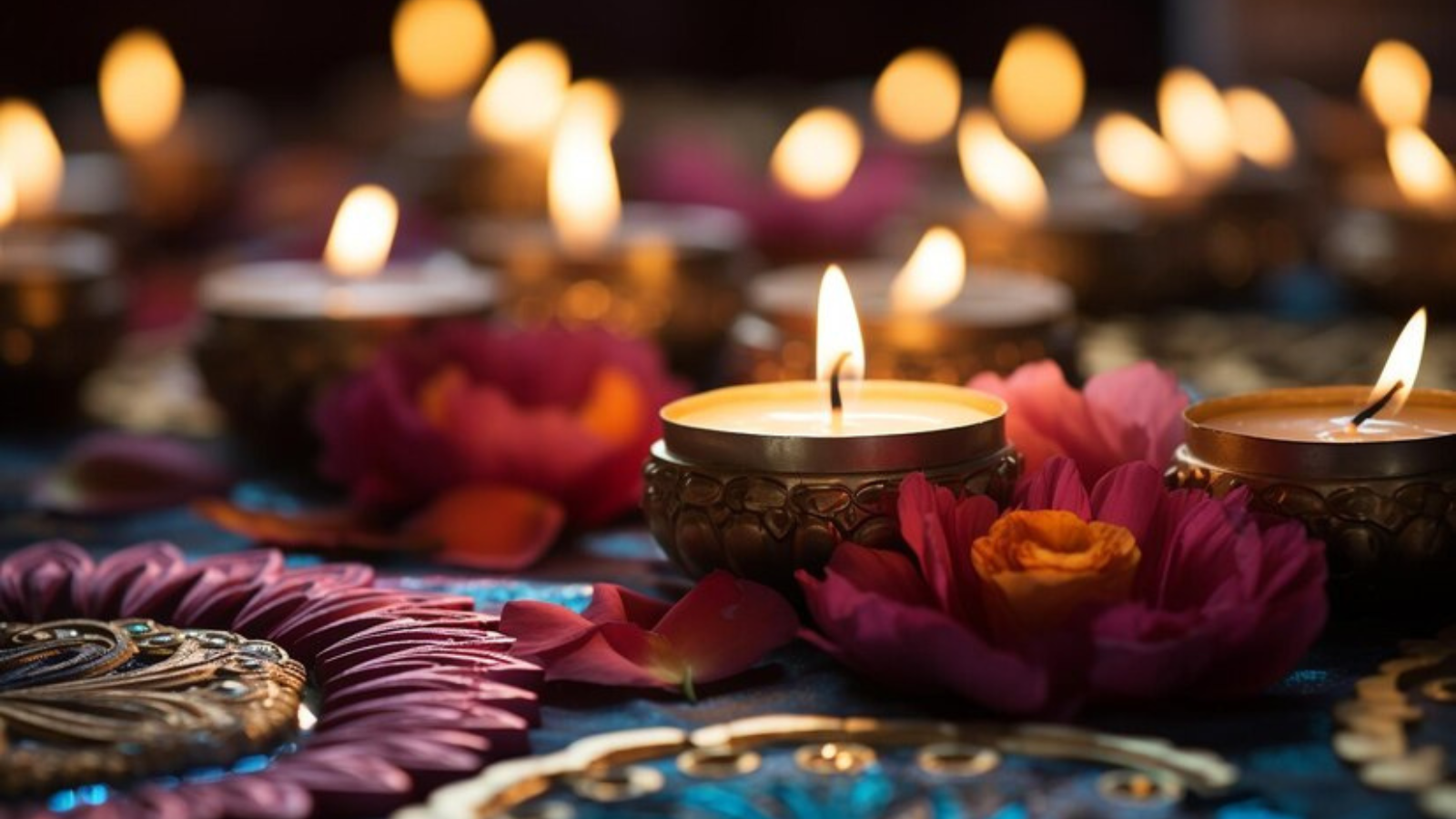Diwali, known as the festival of lights , is a vibrant celebration that symbolizes the triumph of good over evil and light over darkness. While the essence of Diwali remains constant, each region of India showcases its distinct customs and traditions. Here’s a look at eight unique Diwali traditions from various parts of India that highlight the diversity of this grand festival.
1. North India: Ram Lila and Festive Revelry
In North India, Diwali commemorates Lord Rama’s return to Ayodhya after vanquishing Ravana. The festival features oil lamps, fireworks, and colorful rangoli designs. A standout tradition is the staging of Ram Lila, a dramatic reenactment of the Ramayana. This event, held days before Diwali, culminates in the burning of effigies of Ravana, Meghnath, and Kumbhkaran. On Diwali night, families worship Goddess Lakshmi, seeking blessings of wealth and prosperity.
2. West Bengal: Kali Puja
In West Bengal, Diwali coincides with Kali Puja, dedicated to the fierce Goddess Kali, who symbolizes the destruction of evil. Homes glow with diyas and lights, but the primary focus is on worshipping Kali. Elaborate statues of the goddess are installed in pandals, where devotees offer flowers, sweets, and sometimes animal sacrifices. The night is filled with prayers and rituals, creating a unique, mystical atmosphere.
3. Maharashtra: Vasu Baras and Govardhan Puja
Maharashtra kicks off its Diwali festivities with Vasu Baras, honoring cows and calves for their role in agriculture. Dhanteras sees families purchasing gold and utensils to welcome good fortune. The following day, Govardhan Puja features a lavish feast known as Faral, with traditional sweets like Ladoo and Chakli. Siblings exchange gifts on Bhau Beej, akin to Raksha Bandhan, celebrating family bonds.
4. Tamil Nadu: Thalai Deepavali
In Tamil Nadu, Thalai Deepavali marks the first Diwali for newlywed couples. The day begins with an oil bath, followed by prayers and wearing new clothes. Newlyweds are showered with blessings and gifts at the bride’s parental home. Traditional sweets such as Adirasam and Murukku are made, and homes are decorated with kolam designs, inviting prosperity and joy.
5. Goa: Narkasur Vadh
Goa's Diwali is defined by the Narkasur Vadh tradition, celebrating the defeat of the demon Narkasur by Lord Krishna. The night before Diwali, large effigies of Narkasur are paraded through the streets with drums and music. At dawn, these effigies are burned, symbolizing the victory of good over evil. Throughout the day, homes are illuminated with earthen lamps, and families exchange sweets and gifts.
6. Uttar Pradesh: Dev Deepawali in Varanasi
In Uttar Pradesh, the Dev Deepawali festival in Varanasi stands out. Celebrated 15 days after Diwali on the full moon of Kartik Purnima, the ghats of the Ganges are adorned with thousands of oil lamps. This event signifies the descent of gods to Earth to bathe in the river. The breathtaking sight of illuminated ghats, combined with devotees floating diyas, creates an unforgettable experience.
7. Odisha: Kaunria Kathi and Badabadua Daka
Odisha observes the Kaunria Kathi ritual during Diwali. After Lakshmi Puja, families burn jute sticks outside their homes to honor their ancestors, known as Badabadua Daka. This practice involves chanting prayers to invite the blessings of departed souls, with the phrase “Badabadua ho...Andhara re aasa, Alua re jaa” serving as a heartfelt connection between the living and their ancestors.
8. Gujarat: Chopda Pujan and Sharda Pujan
In Gujarat, Diwali signifies the end of the traditional Hindu calendar year, focusing on business. On Dhanteras, traders conduct Chopda Pujan to bless their account books, marking a fresh financial start. Following this, Sharda Pujan involves worshipping books and tools related to education and business, reinforcing the theme of renewal and prosperity for the upcoming year.
These diverse traditions showcase the rich cultural tapestry of India, making Diwali not just a festival, but a celebration of regional identities and shared values. Whether through dramatic reenactments, unique rituals, or vibrant feasts, each tradition contributes to the magic of Diwali.
1. North India: Ram Lila and Festive Revelry
In North India, Diwali commemorates Lord Rama’s return to Ayodhya after vanquishing Ravana. The festival features oil lamps, fireworks, and colorful rangoli designs. A standout tradition is the staging of Ram Lila, a dramatic reenactment of the Ramayana. This event, held days before Diwali, culminates in the burning of effigies of Ravana, Meghnath, and Kumbhkaran. On Diwali night, families worship Goddess Lakshmi, seeking blessings of wealth and prosperity.
2. West Bengal: Kali Puja
In West Bengal, Diwali coincides with Kali Puja, dedicated to the fierce Goddess Kali, who symbolizes the destruction of evil. Homes glow with diyas and lights, but the primary focus is on worshipping Kali. Elaborate statues of the goddess are installed in pandals, where devotees offer flowers, sweets, and sometimes animal sacrifices. The night is filled with prayers and rituals, creating a unique, mystical atmosphere.
3. Maharashtra: Vasu Baras and Govardhan Puja
Maharashtra kicks off its Diwali festivities with Vasu Baras, honoring cows and calves for their role in agriculture. Dhanteras sees families purchasing gold and utensils to welcome good fortune. The following day, Govardhan Puja features a lavish feast known as Faral, with traditional sweets like Ladoo and Chakli. Siblings exchange gifts on Bhau Beej, akin to Raksha Bandhan, celebrating family bonds.
4. Tamil Nadu: Thalai Deepavali
In Tamil Nadu, Thalai Deepavali marks the first Diwali for newlywed couples. The day begins with an oil bath, followed by prayers and wearing new clothes. Newlyweds are showered with blessings and gifts at the bride’s parental home. Traditional sweets such as Adirasam and Murukku are made, and homes are decorated with kolam designs, inviting prosperity and joy.
5. Goa: Narkasur Vadh
Goa's Diwali is defined by the Narkasur Vadh tradition, celebrating the defeat of the demon Narkasur by Lord Krishna. The night before Diwali, large effigies of Narkasur are paraded through the streets with drums and music. At dawn, these effigies are burned, symbolizing the victory of good over evil. Throughout the day, homes are illuminated with earthen lamps, and families exchange sweets and gifts.
6. Uttar Pradesh: Dev Deepawali in Varanasi
In Uttar Pradesh, the Dev Deepawali festival in Varanasi stands out. Celebrated 15 days after Diwali on the full moon of Kartik Purnima, the ghats of the Ganges are adorned with thousands of oil lamps. This event signifies the descent of gods to Earth to bathe in the river. The breathtaking sight of illuminated ghats, combined with devotees floating diyas, creates an unforgettable experience.
7. Odisha: Kaunria Kathi and Badabadua Daka
Odisha observes the Kaunria Kathi ritual during Diwali. After Lakshmi Puja, families burn jute sticks outside their homes to honor their ancestors, known as Badabadua Daka. This practice involves chanting prayers to invite the blessings of departed souls, with the phrase “Badabadua ho...Andhara re aasa, Alua re jaa” serving as a heartfelt connection between the living and their ancestors.
8. Gujarat: Chopda Pujan and Sharda Pujan
In Gujarat, Diwali signifies the end of the traditional Hindu calendar year, focusing on business. On Dhanteras, traders conduct Chopda Pujan to bless their account books, marking a fresh financial start. Following this, Sharda Pujan involves worshipping books and tools related to education and business, reinforcing the theme of renewal and prosperity for the upcoming year.
These diverse traditions showcase the rich cultural tapestry of India, making Diwali not just a festival, but a celebration of regional identities and shared values. Whether through dramatic reenactments, unique rituals, or vibrant feasts, each tradition contributes to the magic of Diwali.
You may also like

Everybody knew response to Pahalgam terror attack was inevitable, we carried out precautionary deployments: DGMO Lt Gen Ghai on Op Sindoor

'The more you run..': Manager's shocking reply to employee who requested sick leave goes viral. Netizens say: 'Get a new job ASAP'

TN: TVK headquarters in Chennai reopens, 17 days after Karur tragedy

Delhi government's new taxi app to offer no surge pricing, full fare to drivers

Ravi Kishan reveals an unknown story about SRK from 'Fauji' days: 'Realised why he became King Khan'







